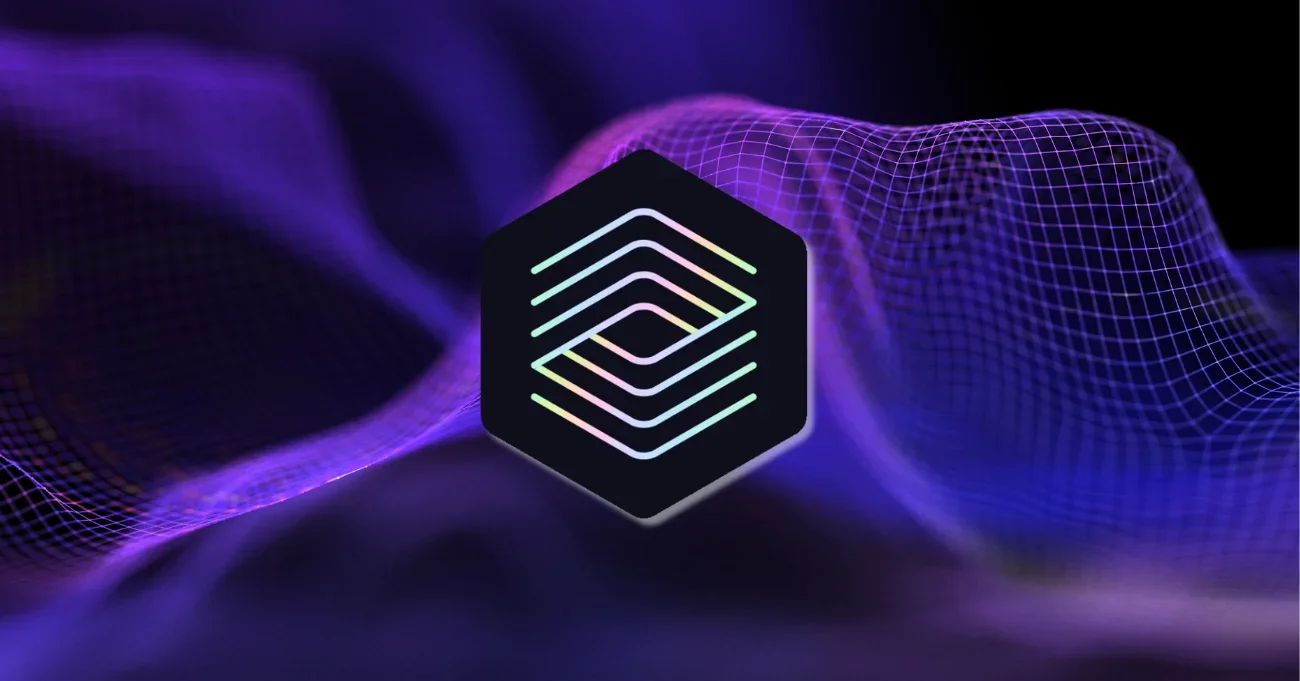OpenAI Codex is a game changer when it comes to natural language processing (NLP). With tools like Codex and GPT-3.5 Turbo, these smart models continue to revolutionize the way we interact with technology. OpenAI's advancements in artificial intelligence (AI) have brought businesses into a new era, opening up vast opportunities for opening up vast opportunities for innovation and efficiency.
Aloa, an industry leader in software development outsourcing, stays ahead of cutting-edge trends in AI so we can apply them to our development process. With extensive experience and a network of over 10,000 pre-vetted development professionals and agencies worldwide, our team is well-positioned to offer valuable insights and reliable information on the latest advancements in AI technology and similar topics.
In this blog, we'll dive deeper into the capabilities of OpenAI Codex and GPT-3.5 Turbo, exploring their impact on the tech industry and their potential to transform various applications ranging from software development to customer service. We'll also go through the benefits and precautions when applying this type of technology.
After reading, you will understand how these AI tools can be leveraged to enhance efficiency and drive innovation in your business operations.
Let's jump in!
What Is OpenAI Codex?
OpenAI Codex is a powerful AI model developed by OpenAI designed specifically for programming tasks. It is an advanced version of the Generative Pre-trained Transformer (GPT) model, widely used for natural language processing tasks. OpenAI Codex provides developers with a tool that understands and generates code in various programming languages.
Codex has been pre-trained on vast code and text data, including public code repositories, documentation, and programming forums. While Codex is a powerful tool, it is essential to remember that Codex no longer receives developers' support. Codex users are encouraged to start using GPT-3.5 Turbo, a more advanced version trained to assist in creating for the same purpose as Codex but with better capabilities.
What is GPT-3.5 Turbo?
GPT-3.5 Turbo is the successor of OpenAI Codex. Released in 2023, GPT-3.5 is a more advanced version of programming AI. As a more sophisticated version of OpenAI Codex, GPT-3.5 offers better accuracy and faster processing times for code-generation tasks. GPT-3.5 Turbo has been designed for various use cases, including natural language processing and machine learning.
How to Use OpenAI Codex vs. How To Use GPT 3.5-Turbo
OpenAI Codex and GPT 3.5 Turbo are language model tools that function similarly. When using these open AI tools, developers need to provide context to the model with a code snippet or query. From there, the program will be able to detect errors or suggest corrections.
Codex OpenAI can only suggest corrections, while GPT 3.5 Turbo can automatically detect and fix potential errors in code. While there is a difference in their capabilities, you can apply the same steps in using OpenAI Codex when using GPT 3.5 Turbo:
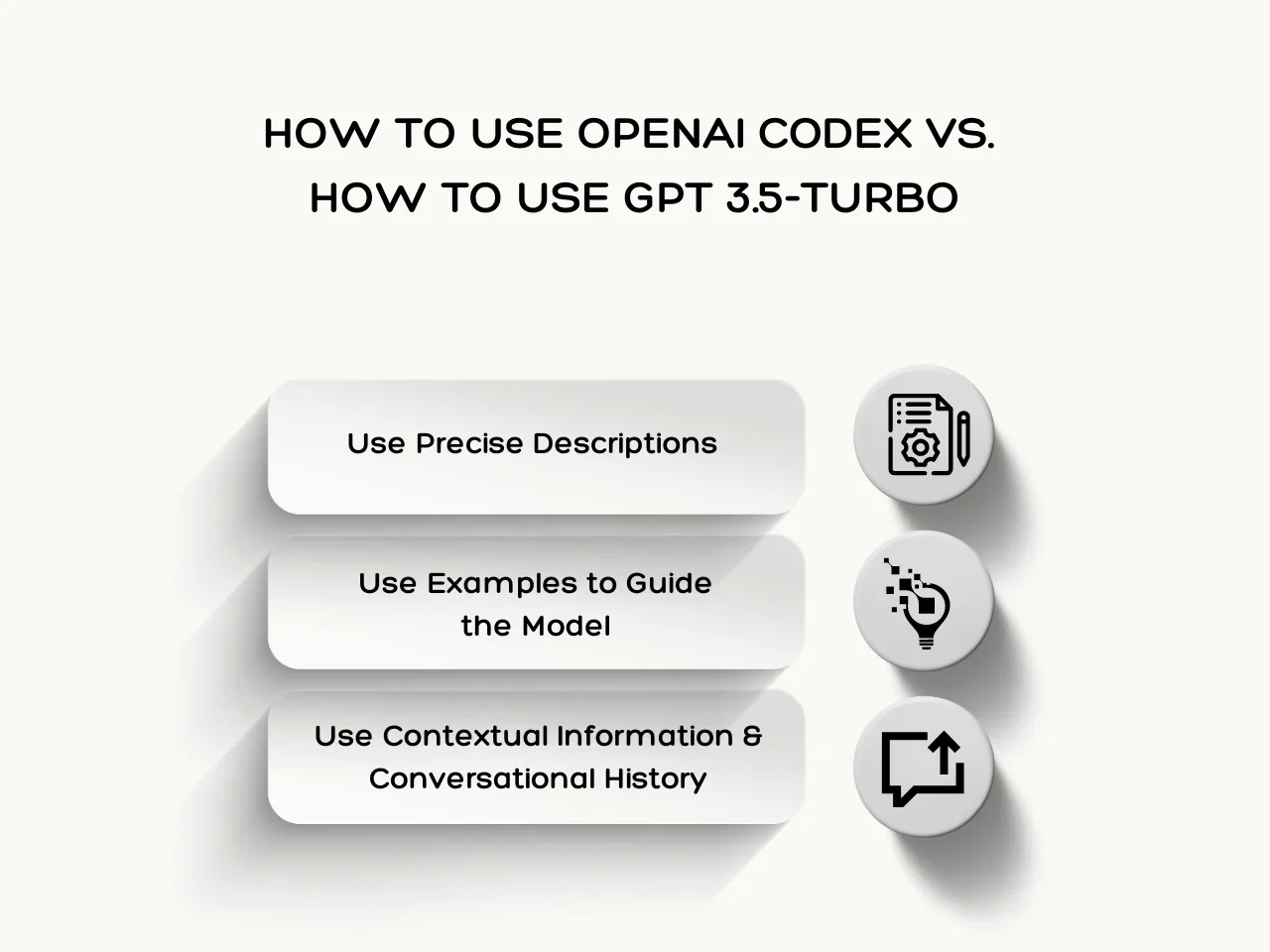
Before You Get Started
OpenAI Codex is available through OpenAI's API. Before you get started, here are some tips you can follow to get the most out of using OpenAI Codex and GPT 3.5 Turbo:
- Get familiar with the capabilities and limitations of the model you want to use.
- Experiment with various prompts and code snippets to discover the best ways to interact with the model.
- Find ways to integrate Codex OpenAI into your development workflow. The API allows you to access the model from your preferred development environment, making it a seamless part of your toolkit.
Following these three tips before starting out ensures you maximize the potential of OpenAI Codex and GPT-3.5 Turbo, leading to more efficient and innovative outcomes in your projects.
Once you've familiarized yourself with these elements, you can then follow the following three steps and start using OpenAI Codex for your development project:
Step 1: Use Precise Descriptions
The OpenAI Codex model and GPT-3.5 Turbo both rely on the input quality to generate accurate and relevant outputs. When creating prompts, it's important to use precise and detailed descriptions that clearly define the task, provide context, and specify any particular requirements or limits.
The best way to go about drafting your instruction is to include phrases that specify the following points:
- The type of language you are after
- The datasets it needs to source
- The kind of software or output you are developing
You can also include additional instructions about any actionable terms, such as:
- "collect"
- "compress"
- "aggregate"
These are just examples, so draft your instructions based on your needs. A completed example of good instructions for OpenAI and GPT 3.5 Turbo may look like this:
#write a node.js script that can scrape a website, chop it up into relevant chunks, and put them in an array.
Here's a quick screenshot of the example above:
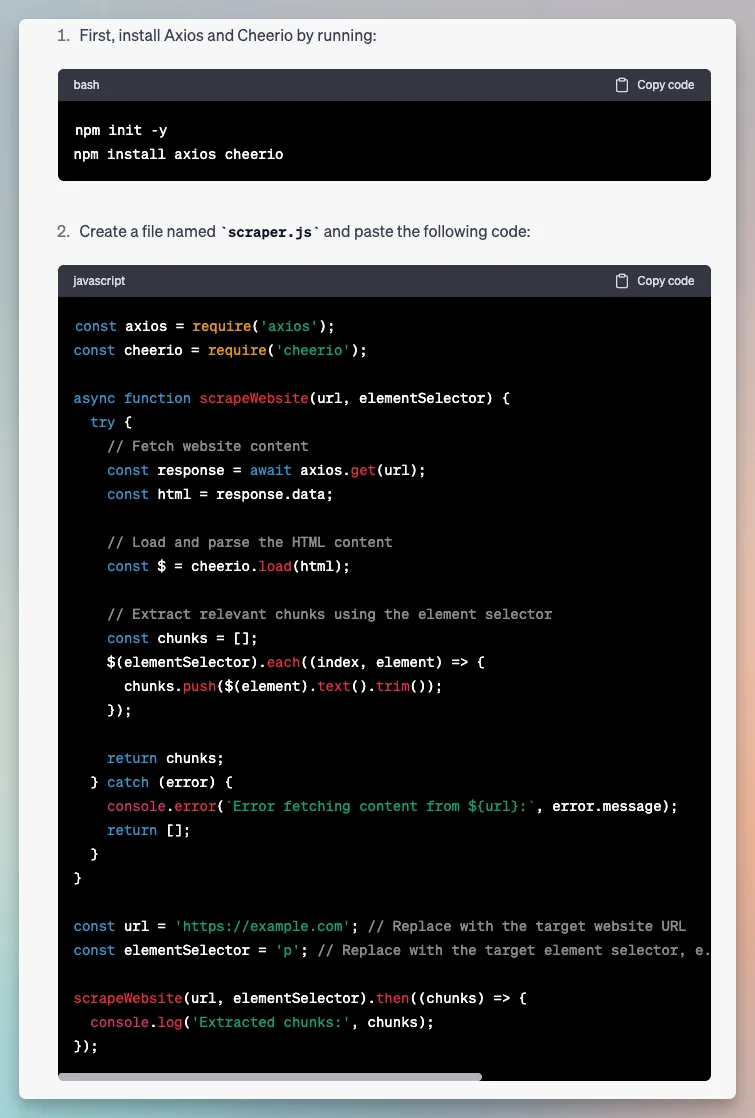
Properly constructing actionable and detailed prompts enables developers to get the results they are after and achieve optimal and highly accurate results.
Step 2: Use Examples to Guide the Model
Aside from using a highly specific set of instructions to guide the AI model, providing examples further increases the likelihood of generating high-quality code that meets your needs. Examples can be data sets, code snippets, or other input forms related to what you're trying to do.
This gives the code generator a better understanding of what kind of output you're after, allowing it to learn from your examples and produce more accurate results. You can also explore forums and community discussions like GitHub, Stack Overflow, or Reddit to better understand the kind of inputs Codex needs to generate the best results.
When teaching your AI model how to generate the right results, having a library of learning resources at your disposal makes it easier for you to streamline code development.
Step 3: Use Contextual Information and Conversational History
Once you've provided the model with the necessary instructions, don't forget to refine your results. OpenAI Codex and GPT 3.5-Turbo learn from their mistakes, so refining your results will help the program improve and become more accurate over time.
Using contextual information such as data structures, functions, and variables to guide the model is one of the best ways to refine your results. Additionally, applying conversational history in the form of feedback, comments, and updates makes it easier for code generators to understand more about a project, allowing them to generate better code.
You can also use a combination of automated testing and manual review techniques to ensure that only quality code is generated. Doing so enables you to iterate quickly and produce better results in the long run.
Hire Professional AI Developers for Your Next Project
Using open API programs like Codex and GPT 3.5 Turbo effectively requires the user to have a good understanding of the best coding practices and latest technologies in order to generate results that are optimized for the type of software being developed.
While it is possible to use online resources like the OpenAI Developer forum and learn these best practices, combining this knowledge with hands-on experience and familiarity with the specific demands of your project will maximize the effectiveness of these advanced tools.
With that said, those looking to develop software solutions using these tools benefit from working with professionals who know how to effectively use the tool and get the desired results. Partnering with a software development company like Aloa connects you with top talent in the industry, ensuring you hire skilled AI developers who can harness the full potential of OpenAI Codex and GPT-3.5 Turbo to deliver exceptional outcomes.
We'll work closely with you and provide you access to specialized expertise so you can stay ahead of rapidly evolving technology trends without the overhead of maintaining an in-house team. Our AI developers bring a wealth of experience with OpenAI Codex and GPT-3.5 Turbo, allowing them to implement advanced features and optimize performance efficiently.
By leveraging their knowledge, you can ensure that your software solutions are not only innovative but also aligned with best practices and industry standards, ultimately driving greater success and efficiency in your projects.
Notable Features of Working with Aloa
- Extensive Partner Network: Aloa has vetted 10,000+ software agencies around the globe to identify and hire the best AI developers with a wealth of experience in using OpenAI Codex and GPT 3.5 Turbo to deliver cutting-edge software solutions.
- Rigorous Vetting Process: Every software developer in our network has undergone a thorough evaluation, ensuring they meet Aloa's stringent quality and proficiency standards. Our team also ensures each AI developer applies the latest tech trends and best practices to client projects.
- Transparent Performance Reports: Aloa ensures consistent updates on the project's progress and lets clients stay informed and confident with every step.
- Dedicated Support System: Aloa offers continuous support throughout the software journey, from initial consultations to project completion. We're here for you.
When hiring AI developers, hourly rates depend on where your team is located. Schedule a call or reach out to sales@aloa.co for a consultation and details on how to hire an AI developer.
OpenAI Codex vs. GPT 3.5-Turbo Features
OpenAI Codex and GPT 3.5-Turbo come with numerous features that enhance the ability of developers, programmers, and coders to accomplish their tasks productively. Apart from that, the core features these programs have can also be seen in influential AI developer tools available on the market today, showcasing their widespread impact and utility.
Let's take a look at the features of Open AI Codex and GPT 3.5 Turbo and how each supports developers in enhancing their productivity and efficiency:
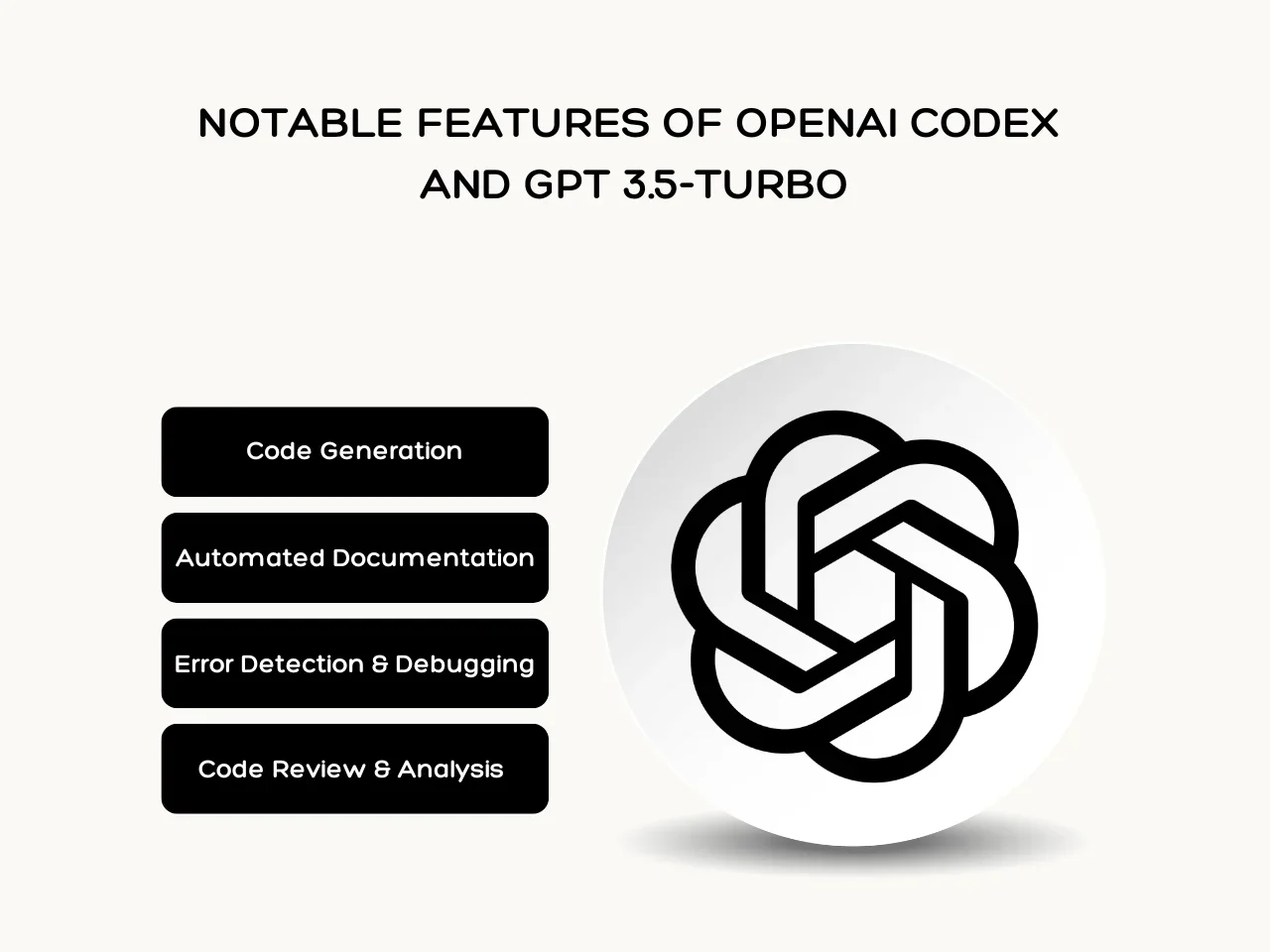
Code Generation
OpenAI Codex has the ability to generate code in any programming language. It also has the capability for code completions, conducting syntax checks, and detecting errors in code. The program also supports an AI editor that highlights syntax for various languages.
On the other hand, GPT 3.5-Turbo's features include more advanced autocompletion and syntax-checking capabilities, error correction, code generation in any language, natural language processing (NLP) support, and a Visual Development Environment (VDE). It also has the ability to generate entire classes of code with the help of AI.
Automated Documentation
Automated documentation is a process that leverages tools and technologies to generate and maintain accurate, up-to-date documentation for software projects with minimal manual intervention. Using OpenAI Codex, developers can generate code documentation, including comments, function descriptions, and API documentation. This can help developers maintain well-documented codebases and improve their projects' overall readability and maintainability.
With GPT 3.5-Turbo, users can leverage an AI-powered auto-documentation tool to generate code documentation and comment blocks automatically. This feature is useful for quickly adding comments and helping developers keep their projects up to date with the latest standards.
Error Detection and Debugging
OpenAI Codex assists developers in detecting errors in their code and suggesting fixes. Leveraging the model's understanding of programming languages and best practices, developers can quickly identify and resolve issues in their code before they become a problem.
Using GPT 3.5, Turbo enhances Codex's error detection capabilities by applying an AI-powered debugger. The debugging tool detects, locates, and fixes errors in code, saving developers time and effort in ensuring their code is robust and error-free.
This AI-powered debugging process not only accelerates the development cycle but also improves code quality by providing intelligent insights and recommendations that align with industry standards.
Code Review and Analysis
Developers can use Codex API and GPT 3.5-Turbo to review and analyze their code, identify areas for improvement, and apply potential optimizations. This can help ensure the code is efficient, maintainable, and adheres to best practices.
GPT 3.5 Turbo improves code review and analysis with its AI-powered code testing platform, which pinpoints any errors, recommends improvements, and provides feedback on coding performance.
OpenAI Codex and GPT 3.5-Turbo both offer powerful coding tools that help developers create better code faster while improving accuracy and speed. As AI technology continues to improve in the coming years, these tools will become increasingly important for developers in 2023 and beyond.
However, GPT 3.5-Turbo does extend the capabilities of Codex by offering more advanced features. It also can generate entire classes of code with the help of AI. With their range of features, users can dramatically reduce the amount of time spent in development cycles while improving accuracy and speed.
Benefits of OpenAI Codex and GPT 3.5-Turbo For Software Development
Without using AI programming tools like OpenAI Codex and GPT 3.5 Turbo, coding can take up significant time and resources, often requiring meticulous attention to detail and extensive debugging. Integrating these AI tools streamlines the coding process and enhances productivity and efficiency.
Here are the core benefits of using OpenAI Codex and GPT 3.5 Turbo in software development:
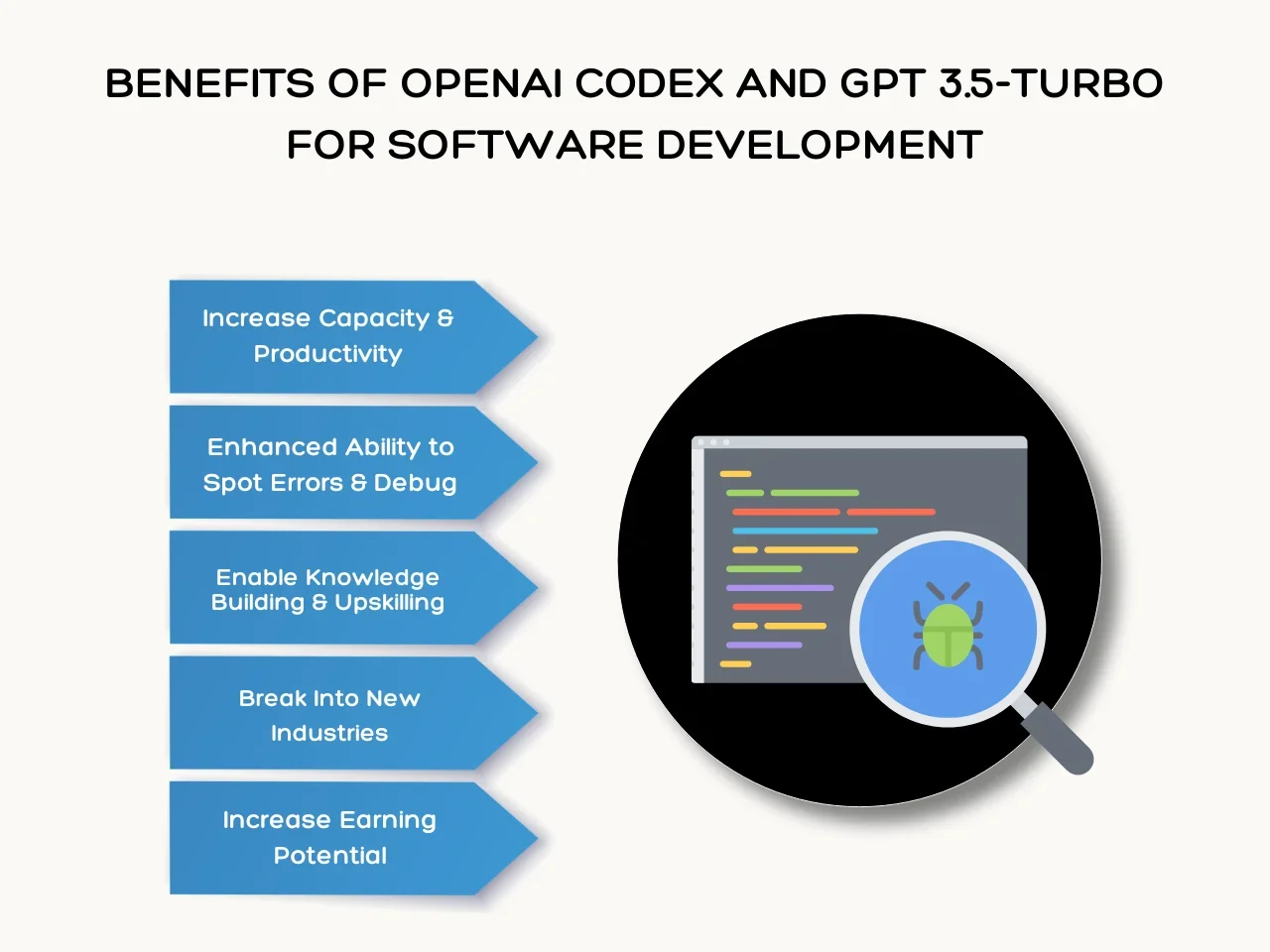
Increase Capacity and Productivity
Using code-generating tools like Codex and Turbo exponentially increases your capacity to produce high-quality, usable codes for a variety of applications. This means that you'll be able to take on more projects and increase your productivity without compromising quality.
Additionally, the model-based learning technology behind such technology enables it to produce accurate, high-quality code quickly with minimal supervision from developers. This reduces the likelihood of errors and bugs popping up in your code.
Enhanced Ability to Spot Errors and Debug
In the event there are bugs or errors in your code, OpenAI Codex and GPT 3.5-Turbo provide built-in tools to help you quickly detect and solve coding errors that plague all development projects. With that, developers can eliminate hours of tedious tasks that are best spent on outputs that require human intervention to complete.
Using the AI model's deep learning technology, it can figure out why a particular function or set of data isn't working as expected and provide suggestions on how to best fix them. This helps developers save time and also makes it easier to spot errors before they become bigger problems.
Enable Knowledge Building and Upskilling
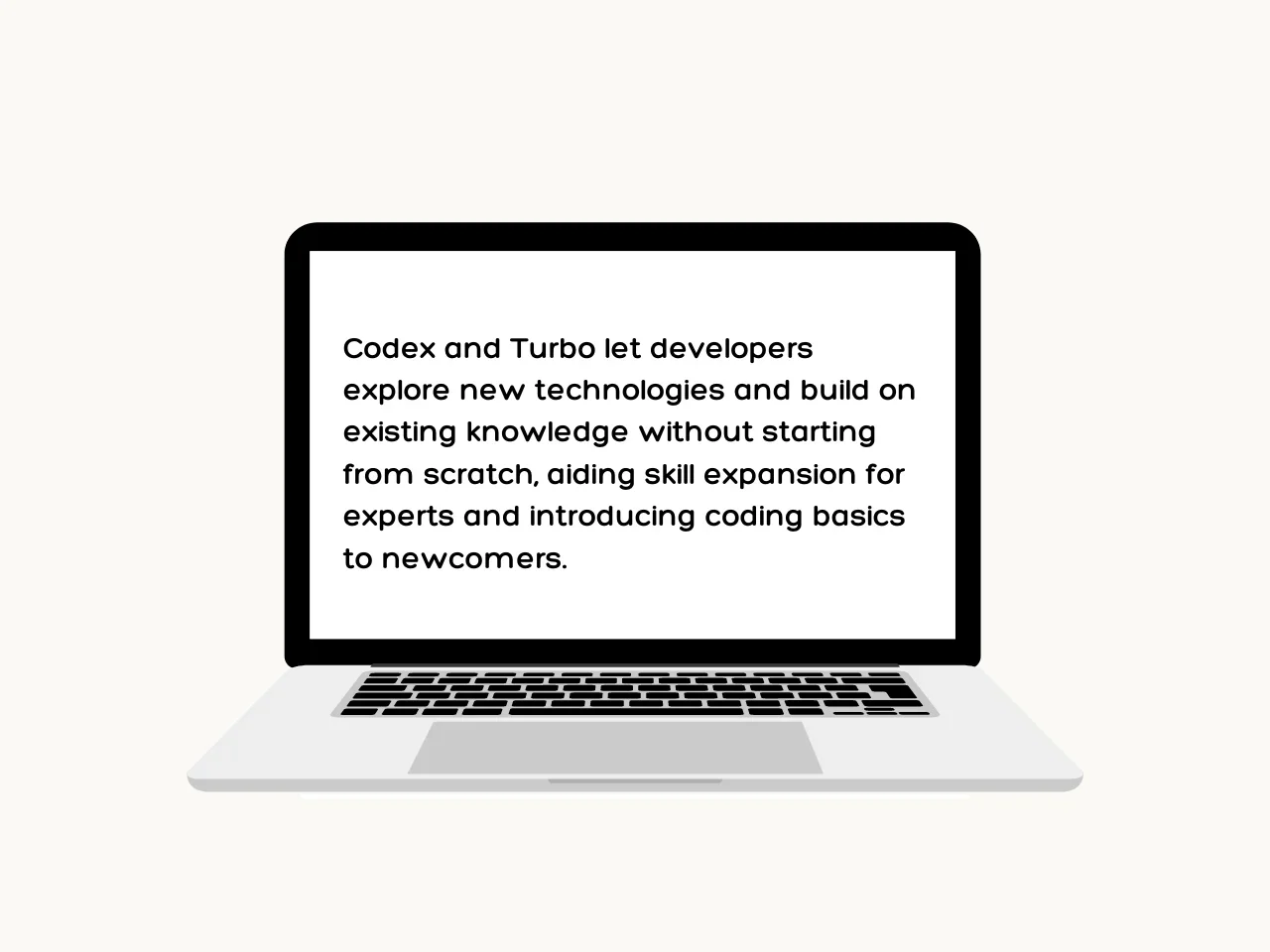
Codex and Turbo both allow developers to explore new technologies and build on their existing knowledge without having to start from scratch. This makes it easier for experienced developers to expand their skill sets while introducing newcomers to coding basics in an easy-to-understand way.
Break Into New Industries
Since Codex and Turbo can be used to learn new coding skills, developers can start to break into new industries with greater ease. Whether you're looking to venture into software engineering or even machine learning, AI-powered code generators are a comprehensive tool that makes it easier for developers to get up and running quickly.
Additionally, developers can apply their skills in generative coding and extend their search for career opportunities to top companies looking to hire developers experienced in ChatGPT and similar programs. This opens up more avenues for career growth and development.
Increase Earning Potential (Whether Freelancer, Agency, or Business)
Once you are able to break into new industries, it becomes easier to offer your potential clients more services. With the help of AI-powered coding, developers can accomplish tasks faster and provide their clients with quality code in a shorter turnaround time. This opens the door for better opportunities, higher earning potential, and even larger projects.
What's more, businesses can leverage AI in business intelligence to gain deeper insights and make data-driven decisions. Integrating AI tools like OpenAI Codex and GPT-3.5 Turbo enables businesses to analyze vast amounts of data more efficiently, uncovering trends and patterns that would be difficult to detect manually. This enhanced capability can lead to the development of more sophisticated software solutions tailored to meet specific business needs and objectives.
Precautions to Take When Using AI Code-Generating Software
While the capabilities and potential of AI code-generating software are impressive by far, it still has a long way to go if it wants to be the go-to option for coders and programmers. With that said, make sure to keep in mind these precautions when using Codex to support your development needs:
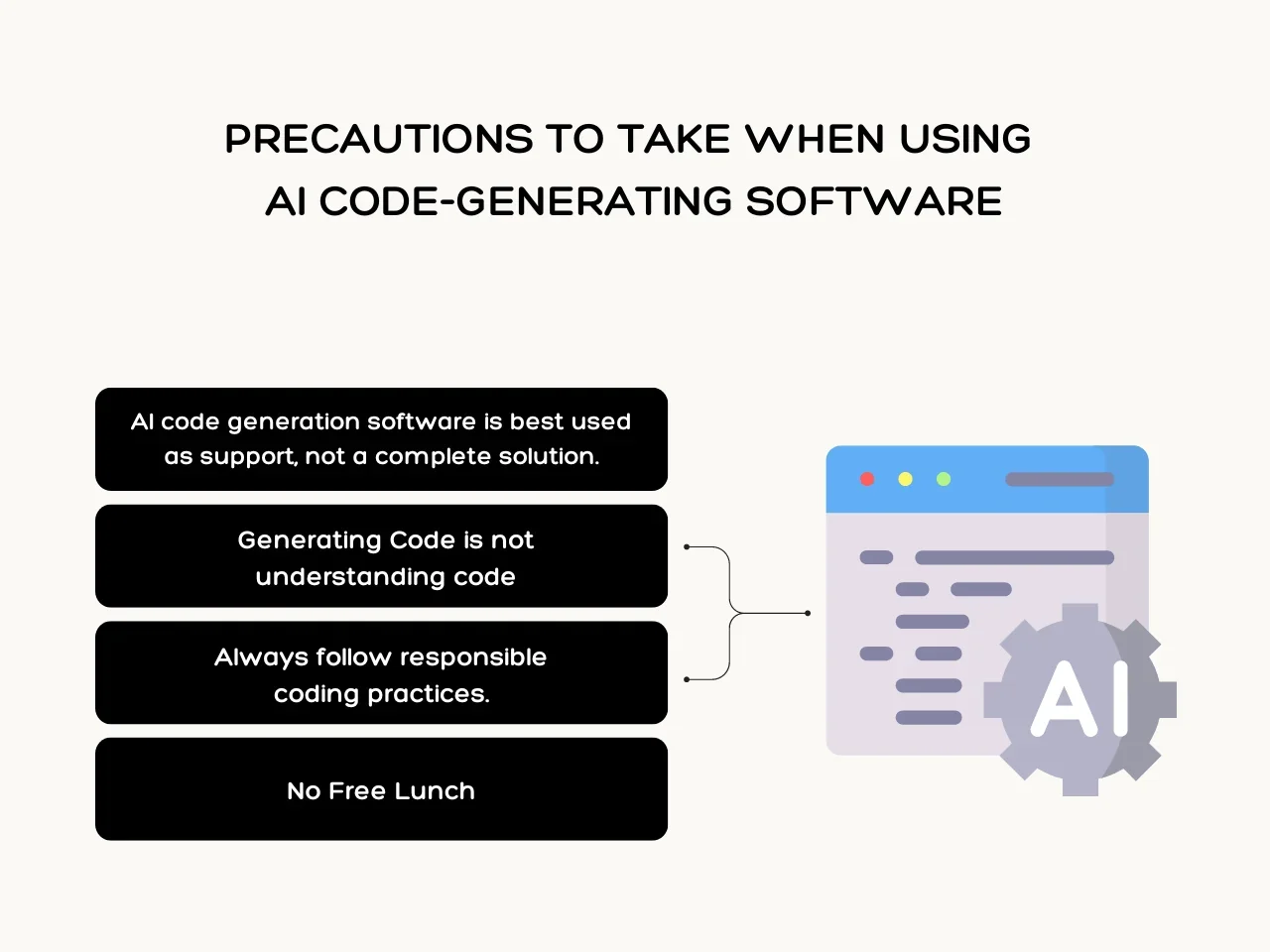
AI Code Generating Software is best used as support, not your end-all-be-all solution.
Like a handful of other AI code generators, Codex and Turbo use machine learning and deep learning to generate output. The output is based on pre-existing code and can be used to supplement your own programming work. You'll still need to debug the generated code, clean it up, and make sure that the output is valid within your project's framework.
Codex and Turbo are not programmers. And it's also not going to take your job (if you're a programmer). Coding is just part of what programmers do. Developers of these tools observe that in their current state, Codex and Turbo may somewhat reduce the cost of producing software by increasing programmer productivity, but it won't replace the other tasks that software developers regularly do, such as conferring with colleagues, writing, designing specifications, and upgrading existing software stacks.
Mistaking these tools for a programmer can also lead to "over-reliance," where a programmer blindly approves any code generated by the model without revising it. Given the obvious and subtle mistakes AI generators can make, overlooking this threat can entail quality and security risks. "Human oversight and vigilance are required for safe use of code generation systems like Codex," OpenAI's researchers warn in their paper.
Generating Code is not understanding code.
The ability of AI coders to generate or complete lines of code may be impressive, but it doesn't mean they understand what that code is for. With that in mind, be wary of generated codes that have nothing to do with what you are trying to create.
There have been cases wherein the tool will generate unrelated or irrelevant output because it assumes so based on your patterns and its understanding of your patterns.
Always follow responsible coding practices.
OpenAI Codex and Turbo are chock-full of datasets and information, but not all of them are meant for public use. In some cases, data scavengers or malicious hackers have been able to "trick" the software into generating code that contains sensitive or private information. It is advised not to use such software on such data and to always stick to responsible coding practices when using the tool.
OpenAI Codex and GPT 3.5-Turbo have made strides in helping developers become more productive and efficient with their coding tasks, but it's important to remember that it is only a tool and should never replace cautious coding practices.
No Free Lunch
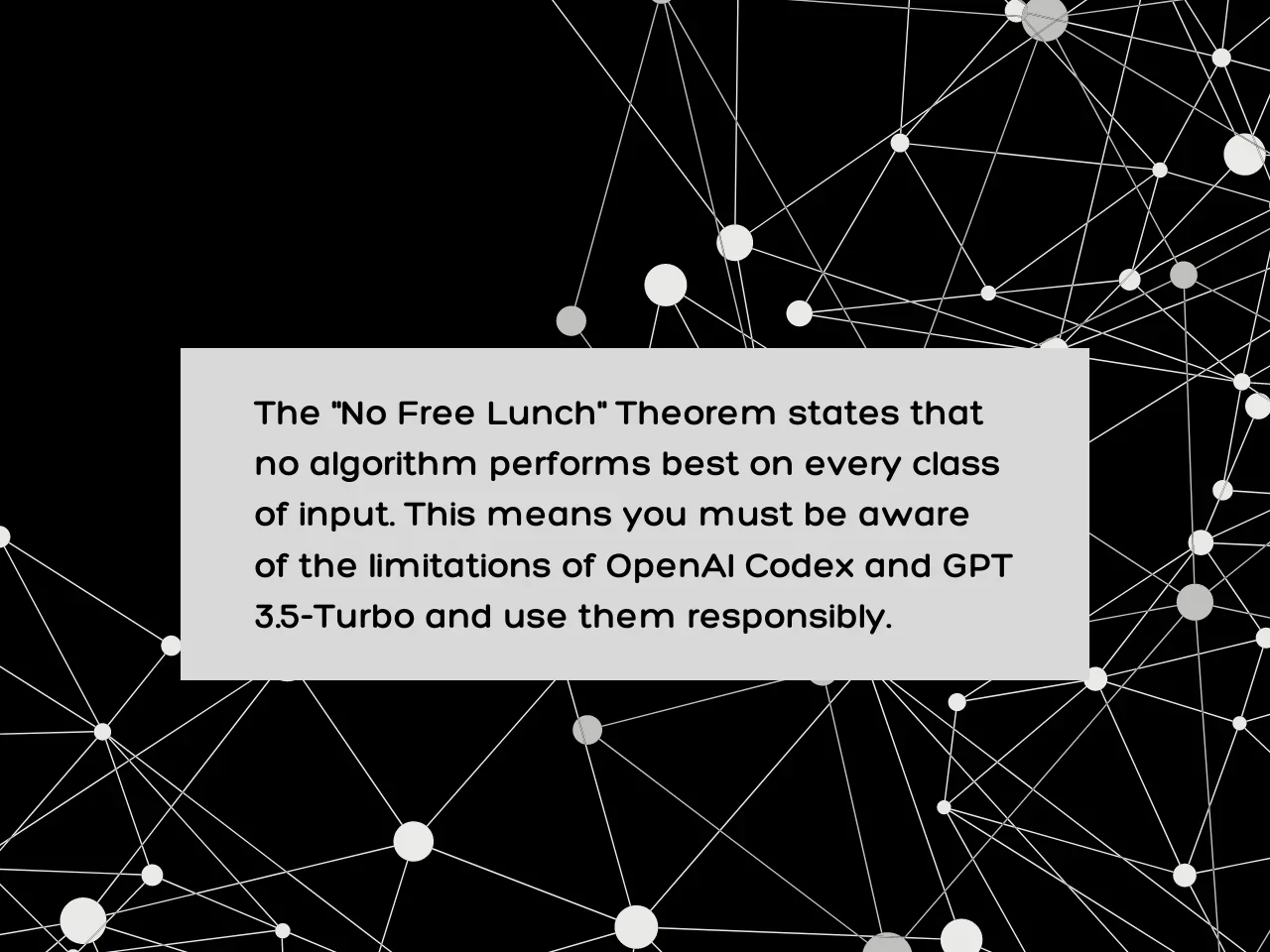
The "No Free Lunch" Theorem states that when searching for a solution to an optimization problem, no algorithm performs best on every possible class of input. Practically, this means you have to be aware of the limitations and boundaries of OpenAI Codex and GPT 3.5-Turbo and use them responsibly.
You can't expect it to solve all your problems – in some cases, manual coding will still be necessary. In the case of these tools, using specific instructions and datasets will help you get the best out of it – but only if you use proper instructive phrases. However, generalized instructions will come at a cost by yielding lower-quality code that may or may not be useful in your project.
At the end of the day, OpenAI Codex and GPT 3.5-Turbo can help you boost your programming efficiency, but it's important to remember that they still require human intervention and oversight for use in production environments.
A developer will always have a place at the table – now more than ever! So don't forget to brush up on your coding skills and make use of OpenAI Codex and GPT 3.5 Turbo to reach new heights of productivity.
Key Takeaway
AI programs like OpenAi Codex and GPT 3.5 Turbo open up vast potential for developers in 2024. While we've only begun to unlock the full capabilities of AI code-generating software, these tools are already transforming the landscape of software development.
Embracing AI tools like OpenAI Codex and GPT-3.5 Turbo positions developers, businesses, and agencies at the forefront of technological advancement, ready to meet the challenges and opportunities of the digital age.
Aloa streamlines your process in hiring skilled AI developers to take on your ensuring you have access to top talent who can effectively utilize tools like OpenAI Codex and GPT-3.5 Turbo. Reach out to our Account Executives through our email, sales@aloa.co, and see how we can ensure your project is on time, on budget, and delivered in high quality.

